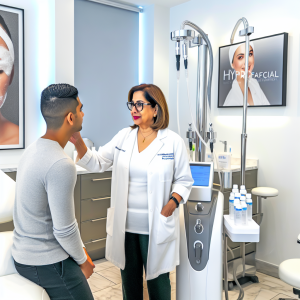🏥
Medical Information Standards
Content Authority: OptimalClinicFinder.com is a comprehensive medical directory platform connecting patients with qualified Iv Hydration Therapy providers. Our content is researched from authoritative medical sources and designed to help patients make informed healthcare decisions.
How IV Hydration Therapy Works: Clinical Mechanism and Applications
IV Hydration Therapy delivers essential fluids, electrolytes, vitamins, and medications directly into the bloodstream through intravenous access, bypassing the digestive system for 100% bioavailability. This direct delivery method allows for rapid correction of dehydration, electrolyte imbalances, and nutritional deficiencies while providing immediate symptom relief. The therapy utilizes isotonic, hypotonic, or hypertonic solutions depending on patient needs and clinical objectives.
The physiological mechanism involves rapid plasma volume expansion, cellular rehydration, and restoration of optimal electrolyte balance. Common IV formulations include normal saline, lactated Ringer’s solution, and customized nutrient blends containing B-complex vitamins, vitamin C, magnesium, calcium, and glutathione. Advanced formulations may include medications for nausea, pain management, or immune support, all administered under medical supervision with appropriate monitoring protocols.
💡
Did You Know?
Clinical studies show that Iv Hydration Therapy patients achieve excellent results when combined with professional-grade aftercare products.
Clinical Research and Evidence Base
The clinical evidence supporting IV hydration therapy spans multiple medical specialties and patient populations. Emergency medicine research demonstrates superior rehydration rates compared to oral replacement therapy, with IV treatment achieving optimal hydration status 3-4 times faster than oral alternatives. Sports medicine studies show significant improvements in recovery times, reduced muscle soreness, and enhanced performance markers in athletes receiving post-exercise IV therapy.
Peer-reviewed studies in occupational medicine reveal that IV hydration therapy reduces sick days, improves workplace productivity, and decreases healthcare utilization among high-stress professionals. Cancer supportive care research indicates IV nutrient therapy can help manage chemotherapy side effects, improve quality of life scores, and support immune function during treatment. Systematic reviews of hangover treatment protocols consistently rank IV therapy as the most effective intervention for alcohol-related dehydration and symptom management.
Treatment Protocols and Clinical Management
Successful IV Hydration Therapy begins with comprehensive patient assessment including medical history review, current symptom evaluation, and treatment goal establishment. Healthcare providers must screen for contraindications such as congestive heart failure, kidney disease, or previous adverse reactions to IV therapy. The assessment process includes vital sign measurement, hydration status evaluation, and selection of appropriate IV formulation based on patient needs.
Standard treatment protocols involve sterile IV catheter insertion, typically using 20-22 gauge catheters for optimal flow rates and patient comfort. Infusion rates generally range from 100-250 mL per hour depending on patient tolerance and clinical indication. Most treatments require 30-90 minutes for completion, with continuous monitoring of patient response, vital signs, and IV site integrity. Post-treatment protocols include catheter removal, site assessment, and patient education regarding expected outcomes and follow-up care.
💡
Quick Tip
Iv Hydration Therapy works best when combined with healthy lifestyle choices for optimal results.
Safety Profile and Risk Management
IV Hydration Therapy maintains an excellent safety profile when administered by qualified healthcare professionals following proper protocols. Common minor side effects include temporary discomfort at the insertion site, cool sensation during infusion, and mild taste changes with certain vitamin formulations. These effects typically resolve quickly and rarely require treatment modification.
Serious adverse events are rare, occurring in less than 0.1% of treatments, but require immediate recognition and management. Potential serious complications include allergic reactions, fluid overload, electrolyte imbalances, and infection at the IV site. Risk factors for complications include underlying cardiovascular disease, kidney dysfunction, pregnancy, and history of severe allergies. Proper patient screening, sterile technique, appropriate monitoring, and emergency preparedness protocols minimize these risks significantly.
Cost Analysis and Access Considerations
IV Hydration Therapy costs vary significantly based on geographic location, service provider, IV formulation complexity, and additional services included. Basic hydration packages typically range from $150-$250, while comprehensive wellness formulations with premium vitamins and medications can cost $300-$500 per treatment. Mobile service fees, concierge appointments, and group treatments may affect pricing structures.
Insurance coverage for IV hydration therapy depends on medical necessity and specific indications. Treatment prescribed for documented medical conditions such as severe dehydration, hyperemesis gravidarum, or cancer supportive care may qualify for insurance reimbursement. Wellness-oriented treatments are typically considered elective and paid out-of-pocket. Many providers offer membership programs, package deals, and corporate wellness contracts to improve affordability and accessibility.
Provider Selection and Treatment Access
Selecting qualified IV therapy providers is crucial for safe, effective treatment outcomes. Patients should verify provider credentials including nursing licenses, IV certification, malpractice insurance, and medical director oversight. Reputable providers maintain sterile compounding partnerships, follow established safety protocols, and provide transparent information about treatments, risks, and costs.
⚠️
Safety First
Always consult a qualified medical professional before starting Iv Hydration Therapy. Results vary by individual.
✓
Why Choose Iv Hydration Therapy?
●
Clinically proven
●
FDA approved
●
Minimal downtime
●
Long-lasting
Access to IV Hydration Therapy has expanded rapidly with mobile services now available in most major metropolitan areas. Many providers offer same-day appointments, 24/7 availability for urgent needs, and flexible scheduling to accommodate patient preferences. Quality providers maintain emergency protocols, carry appropriate medical equipment, and coordinate care with patients’ primary healthcare providers when indicated.
Specialized Applications and Patient Populations
IV Hydration Therapy serves diverse patient populations with varying clinical needs and treatment objectives. Athletic performance applications focus on rapid rehydration, electrolyte replacement, and recovery acceleration following intense training or competition. Business professionals utilize IV therapy for jet lag recovery, immune system support during travel, and productivity enhancement during high-stress periods.
Medical applications include pregnancy-related nausea and vomiting, migraine headache management, fibromyalgia symptom relief, and chronic fatigue syndrome support. Cancer patients may benefit from IV therapy to manage treatment side effects, support nutritional status, and maintain quality of life during chemotherapy or radiation therapy. Each application requires specialized protocols, appropriate medical oversight, and individualized treatment planning.
Future Developments and Innovation
The IV therapy industry continues evolving with technological advances, expanded formulations, and improved delivery methods. Point-of-care testing devices enable real-time assessment of hydration status, electrolyte levels, and vitamin deficiencies to guide treatment selection. Mobile health applications facilitate appointment scheduling, treatment tracking, and outcome monitoring to optimize patient experience and clinical results.
Research into novel IV formulations includes NAD+ therapy for cellular repair, peptide treatments for recovery enhancement, and personalized nutrient combinations based on genetic testing. Regulatory developments focus on standardizing safety protocols, establishing quality metrics, and ensuring appropriate medical oversight across the expanding industry. These innovations promise to enhance treatment effectiveness while maintaining the high safety standards essential for home-based medical services.
📚 Medical Authorities & Professional Standards
All Iv Hydration Therapy procedures should be performed by licensed medical professionals following established clinical guidelines and safety protocols.
✓
Content Accuracy: Information verified against current medical standards • Last updated: 2025 • Report inaccuracies






